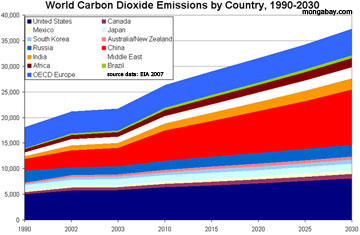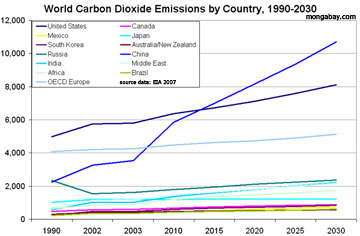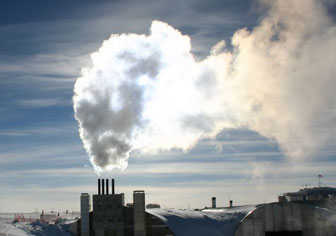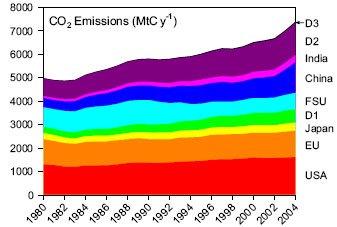Bush unveils global warming strategy
Bush unveils global warming strategy
mongabay.com
May 31, 2007
  click images to enlarge more charts |
Thursday, President Bush outlined his proposal for reducing greenhouse gas emissions, calling for a series of meetings between the world’s largest polluters to establish a global target for emissions reduction. The Associated Press reported that environmentalists quickly dismissed the plan as a “do-nothing” approach, while other critics said the plan comes too late to restore the administration’s credibility after years of dragging its feet and outright rejecting action on global warming.
“Our allies’ pleas for action add to the voices of many big corporations such as Dow, Shell, General Electric, and General Motors,” Daniel J. Weiss, climate strategy director for the Center for American Progress, told the Associated Press. “These and other Fortune 500 companies endorsed a 60 percent to 80 percent reduction in global warming pollution by 2050, the level scientists indicate that we must reach to stave off the worst impacts. Unfortunately, these appeals from his foreign and corporate allies continue to fall on President Bush’s deaf ears.”
To date, the Bush Administration has opposed a global carbon-trading program that would allow countries to buy and sell carbon credits to meet limits on emissions and rejected energy efficiency targets advocated by the EU.
Bush first prominently acknowledged the threat of climate change during his 2007 State of the Union Address address, when he called it a “serious threat.”

Image courtesy of the Lawrence Berkeley National Laboratory. Fossil-fuel CO2 emissions for nine regions defined by the authors. Image courtesy of PNAS and the authors |
According to a senior White House official cited by The Wall Street Journal, Bush plans to make up for lost time.
“[The effort] will be Herculean… you can only start when you’re ready to start.”
Bush’s marketing effort comes a week after a study showed rapid growth of global carbon dioxide emissions and stagnation of gains in carbon intensity, the amount of carbon required to produce a unit of economic output. After a long rise in carbon efficiency, the Proceedings of the National Academy of Sciences study found a reversal in the trend.
“Despite the scientific consensus that carbon emissions are affecting the world’s climate, we are not seeing evidence of progress in managing those emissions in either the developed or developing countries. In many parts of the world, we are going backwards,” said Chris Field of the Carnegie Institution’s Department of Global Ecology and a co-author of the study. “The trends relating energy to economic growth are definitely headed in the wrong direction.”
